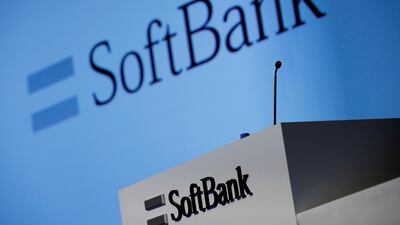SoftBank Group is investing in blockchain infrastructure but not in volatile cryptocurrencies, according to the chief executive of SoftBank Investment Advisers.
“We have stayed away from coins,” Rajeev Misra told delegates at the fifth annual Future Investment Initiative forum in Riyadh on Wednesday. “We can’t quantify it, we can’t put a mathematical model to it.”
The Japanese global technology investor, however, is bullish on prospects of investing in blockchain infrastructure companies as “blockchain is here to stay”, he said.
SoftBank was part of a $900 million funding round in July for FTX Trading, which valued the owner of FTX.COM cryptocurrency exchange at $18 billion.
“Infrastructure is processing power and we have invested in exchanges [such as] FTX and others, where people will go and trade currencies,” he said.
“I won’t say we are [a] heavy investor, but we started investing in the infrastructure of blockchain” a few months ago, he said.
Blockchain technology – a database structured in a manner that is difficult or impossible to hack and on which Bitcoin was built – has spawned opportunities in areas other than cryptocurrency. It disrupted financial services, allows tokenisation of legal documents and has opened up the non-fungible token market.
The size of the global blockchain market is projected to grow to $39.7bn by 2025 from $3bn in 2020, at a compound annual rate of 67.3 per cent, according to Markets and Markets research.
However, cryptocurrencies that are based on blockchain technology have swung wildly this year amid increased regulatory scrutiny, with China in September banning trading and mining of digital assets. There are proponents of cryptocurrencies, with El Salvador this year becoming the first country to accept Bitcoin, the world’s biggest digital currency, as a legal tender.
Softbank’s Vision Fund 1 – backed by Abu Dhabi's Mubadala Investment Company and Saudi Arabia's Public Investment Fund – and its Vision Fund 2 invest across a wide spectrum of technology companies.
For the next two to three years, SoftBank is bullish on investing in education technology and life sciences sectors, Mr Misra said.
“A kid in a small town in India or Africa can get education from MIT or Stanford and that’s happening and that’s accelerating,” he said. “The fact that we are using genetic engineering and AI to come up with a vaccine within six to seven months … shows you how the investment in life sciences is going to accelerate to find cure for a lot of lifestyle diseases and vaccines.”
The appetite for the investing in FinTech will continue to rise as everything from banking services, insurance and asset management will continue to get disrupted, he said.
“The last one for me is e-commerce itself. The way you go and shop on Amazon or Shopify will change with social e-commerce”, where influencers will play a major role, he said. “Social e-commerce is going to be very big. It’s a very fascinating industry.”
In terms of geography, the company is bullish on investing in Europe, Latin America and the broader Middle East region. There is abundance of capital in the US chasing assets but Europe and Latin America still offer investment opportunities.
chief executive, SoftBank Investment Advisers
“The opportunity is global but [the question is] where is the value, where is the lack of capital, where the capital has not reached and where you can invest and get better returns,” Mr Misra said.
The number of unicorns – start-up companies with $1bn or more in valuation – created in Europe has expanded five-fold in the two to three years. The SoftBank Vision Fund 1 has five investments in Europe out of 80 in total. However, its Vision Fund 2 has 50 European investments out of its total of 150.
“It shows Europe is growing, Latin America is growing … if you can go in as a large tech investor, put capital to work, help those companies to grow, I think those two are exciting [markets]”.
Within the Middle East, “GCC is an exciting market”, where it has invested in Unifonic, through its SoftBank Vision Fund 2 and Sanabil Investments, a subsidiary of the kingdom's sovereign wealth Public Investment Fund.
The India market, which has attracted global investors in the past few years, is “a bit overheated and although it is a market of 1.2 billion people, valuations are high", Mr Misra said.
SoftBank and Vision Fund comprise 300 investments, he said. The group has formed a 30-member team that helps portfolio companies to grow and do business with similar businesses, Mr Misra said.
Founders now take capital from those investors who provide capital and an ecosystem to grow, he said.
“They don’t need a lot of help in strategic direction and running their business, they are very good at that. What they need is helping them connect with the rest of the ecosystem.”


